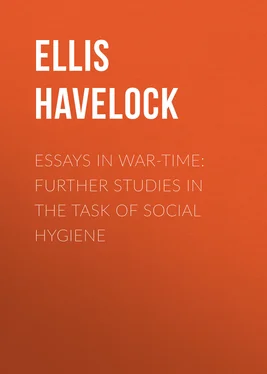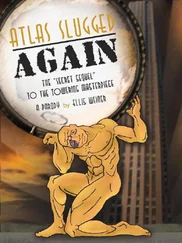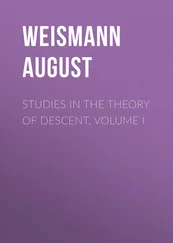Havelock Ellis - Essays in War-Time - Further Studies in the Task of Social Hygiene
Здесь есть возможность читать онлайн «Havelock Ellis - Essays in War-Time - Further Studies in the Task of Social Hygiene» — ознакомительный отрывок электронной книги совершенно бесплатно, а после прочтения отрывка купить полную версию. В некоторых случаях можно слушать аудио, скачать через торрент в формате fb2 и присутствует краткое содержание. Жанр: psy_sex_and_family, foreign_psychology, foreign_edu, на английском языке. Описание произведения, (предисловие) а так же отзывы посетителей доступны на портале библиотеки ЛибКат.
- Название:Essays in War-Time: Further Studies in the Task of Social Hygiene
- Автор:
- Жанр:
- Год:неизвестен
- ISBN:нет данных
- Рейтинг книги:5 / 5. Голосов: 1
-
Избранное:Добавить в избранное
- Отзывы:
-
Ваша оценка:
- 100
- 1
- 2
- 3
- 4
- 5
Essays in War-Time: Further Studies in the Task of Social Hygiene: краткое содержание, описание и аннотация
Предлагаем к чтению аннотацию, описание, краткое содержание или предисловие (зависит от того, что написал сам автор книги «Essays in War-Time: Further Studies in the Task of Social Hygiene»). Если вы не нашли необходимую информацию о книге — напишите в комментариях, мы постараемся отыскать её.
Essays in War-Time: Further Studies in the Task of Social Hygiene — читать онлайн ознакомительный отрывок
Ниже представлен текст книги, разбитый по страницам. Система сохранения места последней прочитанной страницы, позволяет с удобством читать онлайн бесплатно книгу «Essays in War-Time: Further Studies in the Task of Social Hygiene», без необходимости каждый раз заново искать на чём Вы остановились. Поставьте закладку, и сможете в любой момент перейти на страницу, на которой закончили чтение.
Интервал:
Закладка:
Whatever may be the result of war on the quality of the breed, there can be little doubt of its temporary effect on the quantity. The reaction after war may create a stimulating influence on the birth-rate, leading to a more or less satisfactory recovery, but it seems clear that the drafting away of a large proportion of the manhood of a nation necessarily diminishes births. At the present time English Schools are sending out an unusually small number of pupils into life, and this is directly due to the South-African War fifteen years ago. Still more obvious is the direct effect of war, apart from diminishing the number of births, in actually pouring out the blood of the young manhood of the race. In the very earliest stage of primitive humanity it seems probable that man was as untouched by warfare as his animal ancestors, and it is satisfactory to think that war had no part in the first birth of man into the world. Even the long Early Stone Age has left no distinguishable sign of the existence of warfare. 7 7 It is true that in the Gourdon cavern, in the Pyrenees, representing a very late and highly developed stage of Magdalenian culture, there are indications that human brains were eaten (Zaborowski, L'Homme Préhistorique , p. 86). It is surmised that they were the brains of enemies killed in battle, but this remains a surmise.
It was not until the transition to the Late Stone Age, the age of polished flint implements, that we discern evidences of the homicidal attacks of man on man. Even then we are concerned more with quarrels than with battles, for one of the earliest cases of wounding known in human records, is that of a pregnant young woman found in the Cro-magnon Cave whose skull had been cut open by a flint several weeks before death, an indication that she had been cared for and nursed. But, again at the beginning of the New Stone Age, in the caverns of the Beaumes-Chaudes people, who still used implements of the Old Stone type, we find skulls in which are weapons of the New Stone type. Evidently these people had come in contact with a more "civilised" race which had discovered war. Yet the old pacific race still lingered on, as in the Belgian people of the Furfooz type who occupied themselves mainly with hunting and fishing, and have their modern representatives, if not their actual descendants, in the peaceful Lapps and Eskimo. 8 8 Zaborowski, L'Homme Préhistorique , pp. 121, 139; Lapouge, Les Sélections Sociales , p. 209.
It was thus at a late stage of human history, though still so primitive as to be prehistoric, that organised warfare developed. At the dawn of history war abounded. The earliest literature of the Aryans—whether Greeks, Germans, or Hindus—is nothing but a record of systematic massacres, and the early history of the Hebrews, leaders in the world's religion and morality, is complacently bloodthirsty. Lapouge considers that in modern times, though wars are fewer in number, the total number of victims is still about the same, so that the stream of bloodshed throughout the ages remains unaffected. He attempted to estimate the victims of war for each civilised country during half a century, and found that the total amounted to nine and a half millions, while, by including the Napoleonic and other wars of the beginning of the nineteenth century, he considered that that total would be doubled. Put in another form, Lapouge says, the wars of a century spill 120,000,000 gallons of blood, enough to fill three million forty-gallon casks, or to create a perpetual fountain sending up a jet of 150 gallons per hour, a fountain which has been flowing unceasingly ever since the dawn of history. It is to be noted, also, that those slain on the battlefield by no means represent the total victims of a war, but only about half of them; more than half of those who, from one cause or another, perished in the Franco-Prussian war, it is said, were not belligerents. Lapouge wrote some ten years ago and considered that the victims of war, though remaining about absolutely the same in number through the ages, were becoming relatively fewer. The Great War of to-day would perhaps have disturbed his calculations, unless we may assume that it will be followed by a tremendous reaction against war. For when the war had lasted only nine months, it was estimated that if it should continue at the present rate (and as a matter of fact its scale has been much enlarged) for another twelve months, the total loss to Europe in lives destroyed or maimed would be ten millions, about equal to five-sixths of the whole young manhood of the German Empire, and nearly the same number of victims as Lapouge reckoned as the normal war toll of a whole half-century of European "civilisation." It is scarcely necessary to add that all these bald estimates of the number of direct victims to war give no clue to the moral and material damage—apart from all question of injury to the race—done by the sudden or slow destruction of so large a proportion of the young manhood of the world, the ever widening circles of anguish and misery and destitution which every fatal bullet imposes on humanity, for it is probable that for every ten million soldiers who fall on the field, fifty million other persons at home are plunged into grief or poverty, or some form of life-diminishing trouble.
The foregoing considerations have not, however, brought us strictly within the field of eugenics. They indicate the great extent to which war affects the human breed, but they do not show that war affects the quality of the breed, and until that is shown the eugenist remains undisturbed.
There are various circumstances which, at the outset, and even in the absence of experimental verification, make it difficult, or impossible, that even the bare mortality of war (for the eugenical bearings of war are not confined to its mortality) should leave the eugenist indifferent. For war never hits men at random. It only hits a carefully selected percentage of "fit" men. It tends, in other words, to strike out, temporarily, or in a fatal event, permanently, from the class of fathers, precisely that percentage of the population which the eugenist wishes to see in that class. This is equally the case in countries with some form of compulsory service, and in countries which rely on a voluntary military system. For, however an army is recruited, it is only those men reaching a fairly high standard of fitness who are accepted, and these, even in times of peace are hampered in the task of carrying on the race, which the less fit and the unfit are free to do at their own good pleasure. Nearly all the ways in which war and armies disturb the normal course of affairs seem likely to interfere with eugenical breeding, and none to favour it. Thus at one time, in the Napoleonic wars, the French age of conscription fell to eighteen, while marriage was a cause of exemption, with the result of a vast increase of hasty and ill-advised marriages among boys, certainly injurious to the race. Armies, again, are highly favourable to the spread of racial poisons, especially of syphilis, the most dangerous of all, and this cannot fail to be, in a marked manner, dysgenic rather than eugenic.
The Napoleonic wars furnished the first opportunity of testing the truth of Franklin's assertion concerning the disastrous effect of armies on the race, by the collection of actual and precise data. But the significance of the data proved unexpectedly difficult to unravel, and most writers on the subject have been largely occupied in correcting the mistakes of their predecessors. Villermé in 1829 remarked that the long series of French wars up to 1815 must probably reduce the height of the French people, though he was unable to prove that this was so. Dufau in 1840 was in a better position to judge, and he pointed out in his Traité de Statistique that, comparing 1816 and 1835, the number of young men exempted from the army had doubled in the interval, even though the regulation height had been lowered. This result, however, he held, was not so alarming as it might appear, and probably only temporary, for it was seemingly due to the fact that, in 1806 and the following years, the male population was called to arms in masses, even youths being accepted, so that a vast number of precocious marriages of often defective men took place. The result would only be terrible, Dufau believed, if prolonged; his results, however, were not altogether reliable, for he failed to note the proportion of men exempted to those examined. The question was investigated more thoroughly by Tschuriloff in 1876. 9 9 Revue d'Anthropologie , 1876, pp. 608 and 655.
He came to the conclusion that the Napoleonic wars had no great influence on stature, since the regulation height was lowered in 1805, and abolished altogether for healthy men in 1811, and any defect of height in the next generation is speedily repaired. Tschuriloff agreed, however, that, though the influence of war in diminishing the height of the race is unimportant, the influence of war in increasing physical defects and infirmities in subsequent generations is a very different matter. He found that the physical deterioration of war manifested itself chiefly in the children born eight years afterwards, and therefore in the recruits twenty-eight years after the war. He regarded it as an undoubted fact that the French army of half a million men in 1809 increased by 3 per cent. the proportion of hereditarily infirm persons. He found, moreover, that the new-born of 1814, that is to say the military class of 1834, showed that infirmities had risen from 30 per cent. to 45.8 per cent., an increase of 50 per cent. Nor is the status quo entirely brought back later on, for the bad heredity of the increased number of defectives tends to be still further propagated, even though in an attenuated form. As a matter of fact, Tschuriloff found that the proportion of exemptions from the army for infirmity increased enormously from 26 per cent. in 1816-17, to 38 per cent. in 1826-27, declining later to 34 per cent. in 1860-64, though he is careful to point out that this result must not be entirely ascribed to the reversed selection of wars. There could, however, be no doubt that most kinds of infirmities became more frequent as a result of military selection. Lapouge's more recent investigation into the results of the Franco-Prussian war of 1870 were of similar character; when examining the recruits of 1892-93 he found that these "children of the war" were inferior to those born earlier, and that there was probably an undue proportion of defective individuals among their fathers. It cannot be said that these investigations finally demonstrate the evil results of war on the race. The subject is complicated, and some authorities, like Collignon in France and Ammon in Germany,—both, it may be well to note, army surgeons,—have sought to smooth down and explain away the dysgenic effects of war. But, on the whole, the facts seem to support those probabilities which the insight of Franklin first clearly set forth.
Интервал:
Закладка:
Похожие книги на «Essays in War-Time: Further Studies in the Task of Social Hygiene»
Представляем Вашему вниманию похожие книги на «Essays in War-Time: Further Studies in the Task of Social Hygiene» списком для выбора. Мы отобрали схожую по названию и смыслу литературу в надежде предоставить читателям больше вариантов отыскать новые, интересные, ещё непрочитанные произведения.
Обсуждение, отзывы о книге «Essays in War-Time: Further Studies in the Task of Social Hygiene» и просто собственные мнения читателей. Оставьте ваши комментарии, напишите, что Вы думаете о произведении, его смысле или главных героях. Укажите что конкретно понравилось, а что нет, и почему Вы так считаете.












